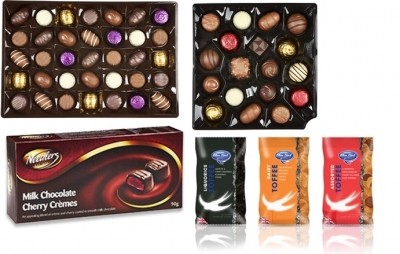Industry Voices: Private label purveyor
Ashbury Chocolates chief spells out trends in private label chocolate

Ashbury manufacturers chocolates and toffees for supermarket own-brands and also produces its own-brands Needler’s and Blue Bird.
Innovation not copying
Speaking to ConfectioneryNews.com, David Zulman, chairman and CEO of Ashbury, said: “Traditionally it was always a private label version of a branded product, but now retailers are looking to innovative products.”
Innovative is anything that is “not just copying a major brand” and could include capitalizing on seasonal events such as Christmas, Valentine’s Day or Easter, he said.
Asked if private label was still suffering a low-quality image problem, Zulman said: “In the last 10 years the market has developed quality substantially to change that perception.”
Zulman said that private label chocolate was harder to sell than other supermarket branded products such as ready meals because of the dominance of Cadbury maker Mondelez International, Nestlé and Mars. However, he added that retailers had begun to demand higher quality.
Audits drive quality
He said that supermarkets conducted technical audits on private label manufacturers once a year to ensure ingredients and packaging were purchased from approved suppliers and agreements were adhered to. Some also conduct social audits to monitor work practices.
Zulman said that premium supermarket Marks & Spencer conducted tougher audits than most to ensure high quality standards.
Due to Ashbury’s volume of customers, it means the company has an audit almost every few weeks.
Zulman said this helped keep quality standards high, but added that “it puts a strait jacket on the business in terms of sourcing and control”.
Future of private label
“In the coming years it [quality] will just improve from where it’s at today,” said Zulman, adding that retailers would drive innovation to diversify product ranges and to compete with branded goods.
He said it wasn’t necessarily bad news for branded goods companies, but “would keep them on their toes” and drive innovation and product development.
However, he said that tertiary brands, those outside the core product range and unsupported by marketing, would suffer.
According to Zulman, there can be as much as 30% higher margins for retailers selling private label compared to branded products, so incentive exists to grow their own-brands.

Asked if supermarkets may one day move confectionery production in-house, he said it would not be possible as retailers were focused on sales and marketing and “manufacturing is complex, challenging and expensive to start-up with high standards”.
Swiss retailer Migros is the only one to manufacturer its own products, while Morrison’s is the only UK retailer to produce its own-brand, but only for fresh produce, meats and prepared foods, said Zulman.
Other markets
Ashbury is also present in export markets including Canada, Australia, France, Germany, Holland and South Africa.
Zulman said that outside the UK, private label chocolate was gaining momentum in Canada, but taking a little longer in Australia.
He said that private label markets tended to develop where there were quality suppliers who were capable of providing the volumes and variety needed.
He added that there were many strong local brand manufacturers in Australia and South Africa that had scope to move into private label but they needed to be prepared to drop their own-brands to avoid a conflict of interest.







